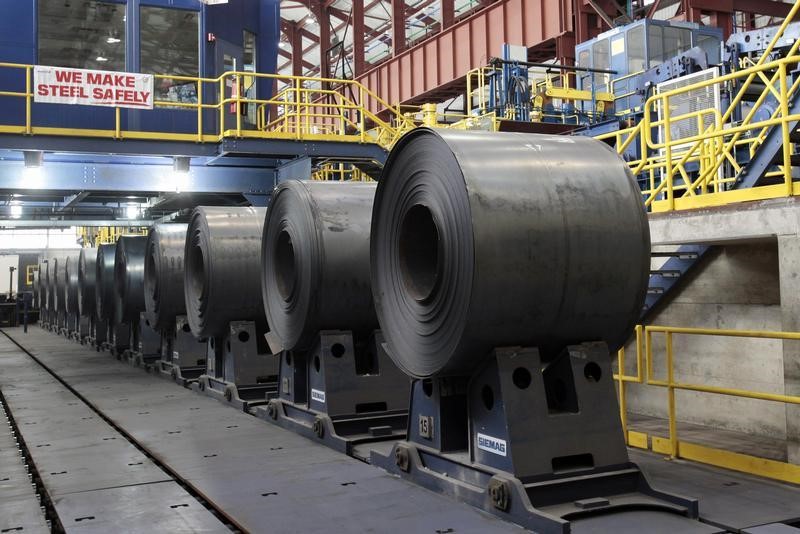By Ernest Scheyder, Catherine Ngai and Terray Sylvester
Jan 27 (Reuters) - When U.S. President Donald Trump signed orders to revive two controversial energy pipeline projects this week, he pledged to require new pipelines to use American-made steel, a gesture to workers in the hard-hit industry who helped propel him to power.
But U.S. steelmakers will receive negligible benefit from the multi-billion dollar Keystone XL project, one of the two projects Trump ordered to proceed, because they have limited ability to meet the stringent materials requirements for the TransCanada TRP.TO line.
Economists said Trump's order has many loopholes to enforcement and could violate international trade law.
Meanwhile, in the quiet prairie town of Gascoyne, North Dakota, deer wander among gleaming stacks of steel tubing intended for the Keystone pipeline. The company bought the material years ago when the U.S. debate was raging over whether the project should go ahead.
TransCanada tried for more than five years to build the 1,179-mile (1,897 km) pipeline, until then-President Barack Obama rejected it in 2015. the materials were already purchased for Keystone, Trump's move to revive the project should not result in new large steel orders.
The profits for manufacturing that steel were booked by companies with corporate headquarters in Russia, India and Italy. Those companies own the steel mills in the United States that made about half of the pipeline for the $8 billion project.
Much of that steel has sat exposed to the elements in several giant stockyards along the pipeline's route for more than two years. Analysts said some of it will need to be replaced.
But that is unlikely to come from U.S. producers, such as U.S. Steel X.N , AK Steel AKS.N or Steel Dynamics STLD.O , analysts and traders said, because of the specialized steel required for the big-ticket project.
Trump's directive on using U.S.-made steel is likely also inconsistent with long-standing World Trade Organization rules that require imported products to be given the same treatment as domestically produced goods. directive could well become the target of a challenge under WTO rules.
Trump's order also runs counter to the North American Free Trade Agreement (NAFTA), a pact that he said he wants to renegotiate but one that nevertheless remains in effect.
'NICE GESTURE'
TransCanada resubmitted its application Keystone project on Thursday, two days after Trump signed the orders.
The line is designed to link existing pipeline networks in Canada and the United States to bring crude from Alberta and North Dakota to refineries in Illinois en route to the Gulf of Mexico.
Around Gascoyne where the tubing has sat idle in a TransCanada yard, there is little sign among residents of the fierce opposition that stopped Keystone and led to the delay of the other controversial pipeline that Trump pushed forward on Tuesday - the Dakota Access Pipeline.
But townspeople were skeptical of Trump's made-in-America order.
"It's a nice gesture, but you can't renegotiate when the pipe's been bought already," said Dan Peterson, 47, a contractor from nearby Bowman, North Dakota, who supports the project.
About half of the pipe was forged in Arkansas, at a plant owned by India's Welspun WGSR.NS . About a quarter came from a Russian-owned plant in the Canadian province of Saskatchewan, and the rest came from Italy and India.
Alberta-based TransCanada expects to use roughly 821,000 tons of pipe in Canada and 660,000 tons in the United States for the project. TransCanada representatives did not return a request for comment.
Trump's order pertains only to sections of pipelines built in the United States, and it said the directive should be followed to the "maximum extent" possible, which gives the administration wiggle room.
Steel manufacturers and analysts said that TransCanada's stringent requirements for the pipeline, including thickness and pressure requirements, already keeps most U.S.-based steelmakers out, given current forging and manufacturing processes.
That includes Nucor (NYSE:NUE) NUE.N and Steel Dynamics, which can make pipeline that is thick enough but may not meet all the pressure parameters. For the main trunk line, experts say that Keystone requires welded line pipe between 36 inches to 42 inches (91 to 107 cm) in diameter.
Foreign-owned steelmakers with U.S. operations, such as India's Welspun and JSW as well as Russia's Evraz, are best able to produce the pipe.
To be sure, U.S. steelmakers have a large part of their business in producing pipe and tube for the oil and gas industry. But, analysts said that to meet Keystone's requirements, they will need to reinvest and retrofit their plants to reorient production. It's not clear if other pipeline projects would have the same standards as Keystone.
"There are people who make (this type of) steel pipe in the U.S., but they're mostly Indian and Russian" companies, said Charles Bradford, an analyst at New York-based Bradford Research.
<^^^^^^^^^^^^^^^^^^^^^^^^^^^^^^^^^^^^^^^^^^^^^^^^^^^^^^^^^^^ GRAPHIC: Keystone pipeline
http://tmsnrt.rs/1kpGlrm
^^^^^^^^^^^^^^^^^^^^^^^^^^^^^^^^^^^^^^^^^^^^^^^^^^^^^^^^^^^>
